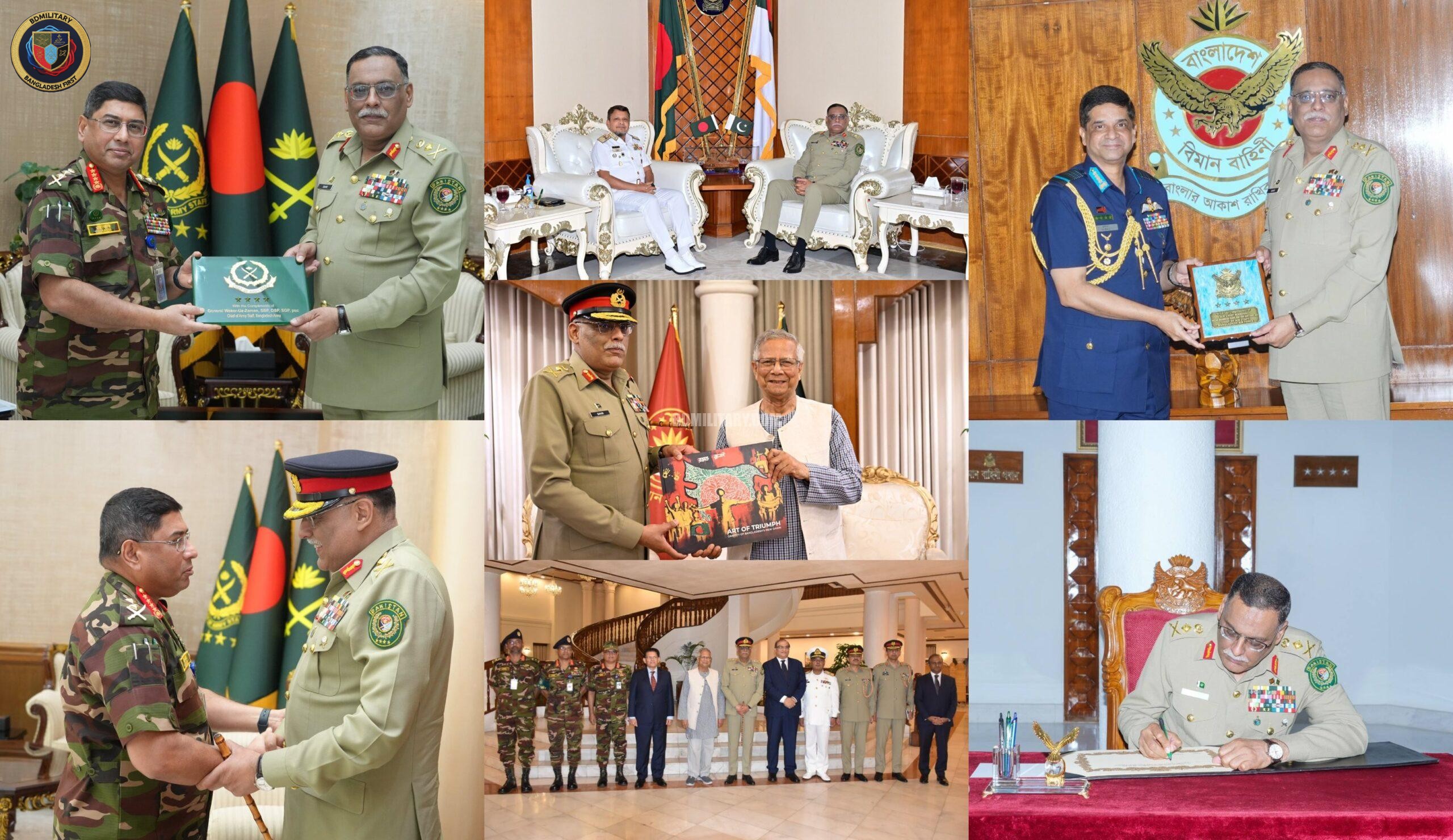A major milestone in South Asian military diplomacy was achieved this week as Pakistan’s Chairman Joint Chiefs of Staff Committee (CJCSC), General Sahir Shamshad Mirza, led a senior defence delegation on an official visit to Bangladesh. The visit, which included meetings with the Chief Adviser of Bangladesh’s interim government, the heads of the Bangladesh Army, Navy, and Air Force, as well as senior officials of the Armed Forces Division, marks a clear upward trajectory in Dhaka–Islamabad defence ties.
During the visit, General Mirza paid a courtesy call on the Chief of Army Staff of Bangladesh at the Army Headquarters. The two leaders exchanged greetings and discussed avenues for strengthening cooperation in the fields of defence, security, and professional military education. Both sides emphasised the need to deepen engagement through joint training programmes, staff college exchanges, seminars, and high-level visits, while maintaining an open and constructive dialogue between the armed forces.
A Renewed Strategic Engagement
The Pakistani delegation’s visit—one of the most significant in recent years—signals a gradual thaw in Dhaka–Islamabad military relations. Historically restrained by the political sensitivities of the post-1971 period, bilateral engagement has seen limited momentum. Yet, both countries share a common heritage in military organisation, doctrine, and professional ethics derived from their pre-1971 structures. The latest visit represents a conscious effort to rebuild those institutional linkages within a modern, forward-looking framework.
Apart from the Army Headquarters call, the delegation also held talks with Chief Adviser Professor Muhammad Yunus, the Chief of Naval Staff Admiral Mohammad Nazmul Hassan, and the Chief of Air Staff Air Chief Marshal Hasan Mahmood Khan, according to statements released by Inter-Services Public Relations (ISPR) and corroborated by media outlets of both countries.
General Mirza also met the Principal Staff Officer of the Armed Forces Division, where both sides reviewed regional security issues, military modernisation efforts, and peacekeeping cooperation under the United Nations. The series of engagements underscore a coordinated approach to rebuilding a working relationship between the two militaries across multiple branches—Army, Navy, and Air Force.
Strengthening Defence and Security Cooperation
During his discussions, General Mirza emphasised Pakistan’s interest in deepening military-to-military cooperation and sharing expertise in specialised fields such as counter-terrorism, cyber defence, and logistics. The Bangladesh side reciprocated with equal enthusiasm, highlighting ongoing reforms under Forces Goal 2030, which seek to transform the country’s armed forces into a more modern, network-centric, and self-reliant structure.
Bangladesh’s Armed Forces are particularly keen on expanding professional education opportunities through officer exchange programmes and joint training modules. Pakistan’s extensive experience in staff college-level education and operational doctrine, especially in high-altitude and mountain warfare, complements Bangladesh’s strength in amphibious, counter-insurgency, and peacekeeping operations.
The exchange of perspectives could open doors to joint curriculum development between institutions such as the Defence Services Command and Staff College (DSCSC) in Mirpur and Pakistan’s National Defence University (NDU) in Islamabad. The prospect of future staff and student exchanges was discussed, aligning with Dhaka’s long-term vision to diversify its international defence training partnerships beyond its traditional network.
The Role of Defence Diplomacy
Defence diplomacy has become a cornerstone of Bangladesh’s foreign policy in recent years. Under the country’s evolving strategic posture, Dhaka seeks to maintain balanced relations with multiple power centres—China, India, the United States, and Turkey—while broadening cooperation with partners in the Middle East, Europe, and now South Asia through pragmatic, issue-based engagement.
This multidirectional diplomacy is rooted in sovereign equality, non-alignment, and mutual benefit, allowing Bangladesh to pursue its national security goals without compromising autonomy. Engagements such as this visit by General Mirza strengthen that posture by demonstrating Dhaka’s ability to sustain open channels with all major regional military powers—India, Pakistan, and China—without being drawn into any axis of influence.
For Pakistan, the visit was equally meaningful. Islamabad has sought to revive its diplomatic and defence ties with Bangladesh over the past few years, following several rounds of quiet back-channel communications. The discussions held in Dhaka reaffirm a willingness on both sides to rebuild trust and move towards cooperation rather than competition.
Regional Context and Geostrategic Implications
The timing of the visit is strategically important. South Asia is undergoing profound shifts driven by new economic corridors, maritime connectivity, and power competition among regional and extra-regional players. Bangladesh’s geographic position between the Bay of Bengal and the Indo-Pacific trade routes gives it increasing strategic relevance, while Pakistan seeks to expand its partnerships in South and Southeast Asia to diversify its own security relationships beyond West Asia and China.
Both nations also face shared challenges—border security, terrorism, cyber threats, and disaster response. Closer cooperation could enhance mutual learning and operational efficiency in these areas. For instance, Bangladesh’s strong record in disaster management and humanitarian assistance could benefit Pakistani counterparts, while Pakistan’s defence-industrial experience and tactical doctrines could offer insights valuable to Bangladesh’s capability development initiatives.
Observers point out that such exchanges also carry symbolic value. They demonstrate that South Asian countries can pursue constructive military diplomacy independent of external mediation, focusing on professional cooperation rather than political rivalry. This pragmatic approach reflects Bangladesh’s emergence as a mature and confident player in regional security affairs.
Maritime and Air Cooperation
The delegation’s meeting with the Chief of Naval Staff Admiral Nazmul Hassan covered potential areas of cooperation in maritime domain awareness (MDA), anti-piracy operations, and hydrographic research. Pakistan’s naval modernisation, including its Turkish-built MILGEM corvettes and Chinese-origin submarines, parallels Bangladesh Navy’s transformation through new frigates, maritime patrol aircraft, and coastal radar systems.
Joint training in navigation safety, search and rescue, and port security could provide tangible benefits to both sides. Moreover, given Bangladesh’s aspiration to become a regional maritime logistics hub under the Blue Economy policy, maintaining friendly naval relations with all major Indian Ocean littoral states—including Pakistan—is strategically prudent.
In the air domain, discussions between General Mirza and Air Chief Marshal Hasan Mahmood Khan focused on flight safety, maintenance cooperation, and training exchanges. Pakistan Air Force’s long history of flight instruction and simulator-based training could complement Bangladesh Air Force’s (BAF) focus on next-generation aircraft integration, including Chinese-made J-10CE fighters, Turkish T-129 attack helicopters, Leonardo radar systems, and Eurofighter Typhoon prospects under ongoing negotiations.
Such dialogue underscores a shared interest in fostering aviation safety standards, technical cooperation, and possibly even joint participation in air exercises or peacekeeping airlift missions under UN mandates.
Historical Context and Path Forward
Bangladesh and Pakistan share deep historical military roots. Prior to 1971, officers from both regions trained and served together under the same institutional traditions. After independence, the two countries maintained limited contact for decades, largely due to political sensitivities. However, the past decade has witnessed incremental rapprochement.
Beginning with diplomatic exchanges in 2018, both countries have reopened dialogue channels, initially focusing on trade and cultural ties before moving cautiously into defence cooperation. Today’s re-engagement can be viewed as the culmination of years of quiet diplomacy by military establishments.
This progress also aligns with Bangladesh’s Forces Goal 2030, which envisions a robust, well-equipped, and internationally engaged defence force capable of operating across diverse environments. Partnering with Pakistan in select professional areas could offer Dhaka cost-effective training options, access to compatible military technologies, and opportunities for doctrinal exchange without political entanglement.
Strategic Autonomy and Non-Alignment
Bangladesh’s approach to defence cooperation is characterised by strategic autonomy—a policy that avoids dependency on any single bloc while leveraging partnerships to strengthen national capacity. Within this framework, Dhaka continues to pursue advanced systems from Europe and Türkiye while deepening ties with long-standing partners such as China.
Engagements with Pakistan fit neatly within this balanced model. They do not signify alignment but reflect professional engagement grounded in mutual benefit. This is particularly relevant at a time when the broader South Asian landscape is polarised by competing alliances.
By expanding contacts with Pakistan, Bangladesh reinforces its message that its foreign and defence policies are sovereign, interest-driven, and open to cooperation with any country willing to engage on equal terms. Such diplomacy enhances Dhaka’s leverage and credibility as an independent regional actor.
A Future of Constructive Cooperation
Both sides expressed optimism about the visit’s outcome, describing it as a foundation for sustained engagement in the years ahead. The delegation’s interactions across the Army, Navy, and Air Force established a multi-tiered framework for cooperation encompassing training, logistics, research, and professional development.
In the coming years, observers anticipate possible reciprocal visits, defence exhibitions, and collaborative workshops on topics such as strategic studies, peacekeeping, and disaster management. Pakistan’s defence industry, with its experience in small arms, ammunition, and light-vehicle production, could also offer collaboration potential for Bangladesh’s emerging defence manufacturing sector under the Directorate General of Defence Purchases (DGDP) and the Bangladesh Ordnance Factories (BOF).
For both nations, the real test will lie in maintaining this momentum through practical follow-up measures rather than symbolic gestures. Regular staff talks, participation in regional seminars, and coordination in UN missions could ensure that the renewed goodwill translates into tangible results.
Outcome
General Sahir Shamshad Mirza’s visit to Dhaka stands as a landmark in Bangladesh–Pakistan relations—one that reaffirms the importance of professional military diplomacy as a tool of statecraft. It reflects a mutual understanding that despite historical differences, both nations can cooperate in areas of shared interest to promote stability, learning, and peace.
As Bangladesh continues its journey toward a modern, self-reliant, and globally engaged defence force, building balanced partnerships across the region remains vital. The strengthening of Bangladesh–Pakistan defence ties, therefore, represents more than symbolic goodwill—it is a strategic move grounded in pragmatism, professionalism, and regional vision.

Ayesha Farid is a regional security specialist focusing on South Asia, with over a decade of experience analysing inter-state tensions, cross-border insurgency, and regional power dynamics. She has worked with leading policy think tanks and academic institutions, offering nuanced insights into the complex security challenges shaping the subcontinent. Ayesha’s expertise spans military doctrines, border disputes, and regional cooperation frameworks, making her a vital contributor to BDMilitary’s coverage of South Asian strategic affairs. She leads the Geopolitics & Diplomacy section at BDMilitary. Ayesha holds a dual master’s degree — a Master in International Relations from the IE School of Politics, Economics & Global Affairs, Spain, and a Master of Public Policy from the Munk School of Global Affairs, University of Toronto, Canada — combining deep academic insight with practical policy expertise.


